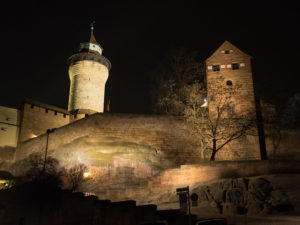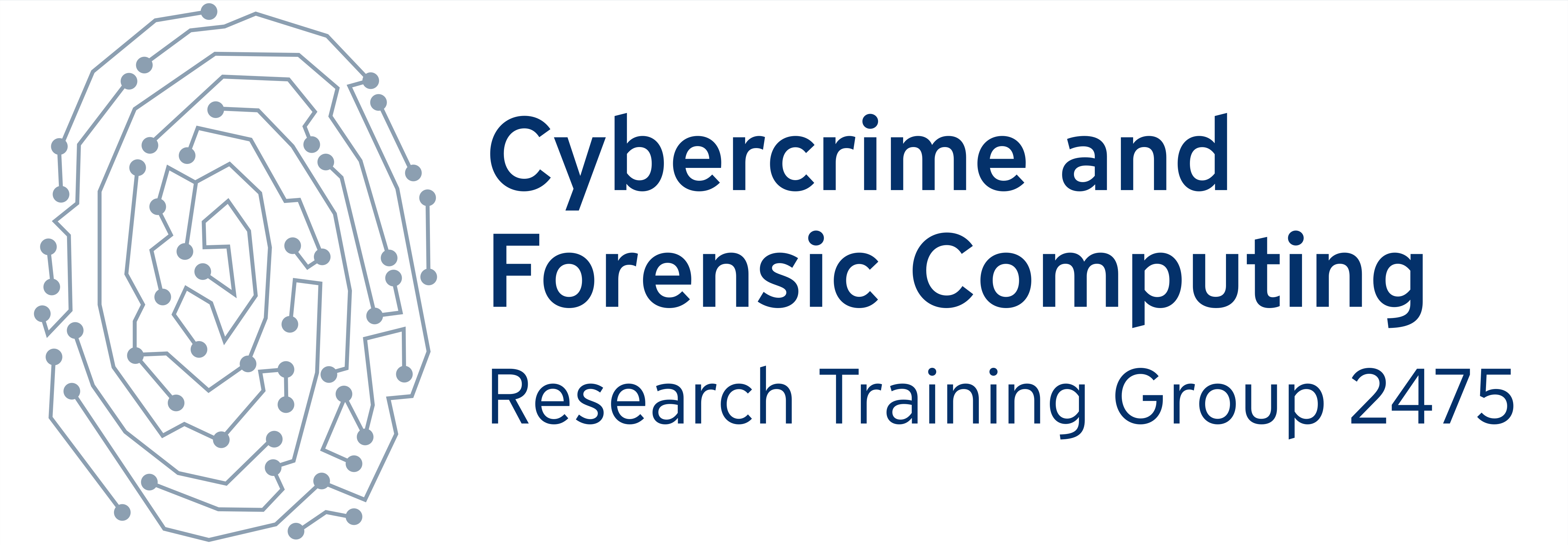International Summer School on Cybercrime and Forensic Computing 2025
International Summer School on Cybercrime and Forensic Computing
Tuesday, June 3 – Friday, June 6, 2025
Nürnberg, Germany
Background and Scope
Information technology has caused a new form of crime to emerge: cybercrime. It is incurring an increasing cost on modern society and is arguably threatening the stability of our economic system. Traditional law enforcement approaches appear to struggle with this new development.

However, with new technologies also come new forms of criminal investigation, like large-scale data analysis and police trojans for covert surveillance. The effectiveness of such methods routinely raises questions regarding their effects on the constitutional rights of affected citizens. The inherent bounds of national law complicate matters further.
The International Summer School on Cybercrime and Forensic Computing is a one-week intensive course at the intersection of computer science and criminal law. It provides students the opportunity to learn and gain inspiration from world experts in digital forensics and criminal law. The summer school aims at Master students in computer science, forensic science, criminal justice, law or related subjects. It is not required to bring specific prior knowledge. As an interdisciplinary summer school, courses will be aimed at novices in the area.
Confirmed Speakers
We are delighted to announce the following list of renowned speakers (in alphabetical order):
- Eoghan Casey, University of Lausanne, Switzerland
Eoghan Casey is an internationally recognized expert in digital forensic investigation and cyber risk mitigation. He has extensive experience on a wide range of cybercrime investigations, and has delivered expert testimony in civil and criminal matters in the United States, Canada, and international tribunals. Dr. Casey is editor and coauthor of the Handbook of Digital Forensics & Investigation and he wrote the foundational book Digital Evidence & Computer Crime, now in its third edition. He serves on the Board of Directors of DFRWS.org and has a PhD in Computer Science from University College Dublin. - Catherine Jasserand, University of Groningen, The Netherlands
Catherine holds a PhD from the University of Groningen in the field of biometrics and privacy, an LL.M in IP and New Technology law from UC Berkeley, and a Master’s degree in European law from Université Panthéon-Sorbonne. She worked in various EU institutions (European Parliament, European Central Bank) as well as in the private sector. Before joining the University of Groningen in 2014, she was a researcher at the University of Amsterdam (IViR), where she did research on IP (online intermediaries’ liability, copyright and public sector information) and media law. Catherine is qualified as a lawyer in France and in the United States (New York Bar). In February 2024, she joined the University of Groningen, Faculty of Law as an assistant professor where she will research the intersection between AI, biometrics, and fundamental rights. In parallel, she has set up her own consultancy company to provide trainings and participate in research projects.
- Simson Garfinkel, BasisTech LLC, USA
Simson L. Garfinkel has published articles in both the academic and popular press for many years in the areas of computer security, digital forensics and privacy. He is a fellow of the American Association for the Advancement of Science (AAAS), the Association for Computing Machinery (ACM) and the Institute for Electrical and Electronics Engineers (IEEE), holds a PhD in Computer Science from MIT. He was previously an Associate Professor at the Naval Postgraduate School and spent 15 years as a computer scientist within the US Department of Defense, the National Institute of Standards and Technology (NIST), the US Census Bureau, and the US Department of Homeland Security. - Marie-Helen Maras, John-Jay College of Criminal Justice, New York, USA
Marie-Helen Maras, Professor and Director of the Center for Cybercrime Studies, John Jay College of Criminal Justice, City University of New York, USA, author of numerous books, including Real Criminology (Oxford University Press), Cybercriminology (Oxford University Press) and Computer Forensics: Cybercriminals, Laws, and Evidence (Jones and Bartlett), among others. - Radina Stoykova, University of Groningen, The Netherlands
Radina (Adi) Stoykova is assistant professor in technology law at the University of Groningen (RUG). She holds a dual PhD in law and information security from RUG and the Norwegian University of Science and Technology. She is specializing in reliability of digital evidence, AI-generated evidence, and digital forensics standardization.
Mock Trial
A signature event within this summer school is a mock trial in which participants jointly solve a small case and defend it in court. The trial will be held on the last day of the summer school in the same court house where the famous Nürnberg war trials were held 1945-1946. Presentations will be judged and winning teams will receive prizes. Details on the mock trial and how to prepare can be found below.
Call for Participation
The target audience are Master or Graduate students in a field related to the topic of the summer school.
The deadline for registration is Monday, April 14, 2025 (deadline has passed). Application materials consist of a CV, a transcript of records and letter of motivation which explains, how the event matches your interests and fits into your career plans. The number of participants is limited.
If you have any questions, please contact us via email <cybercrime-summerschool@fau.de>.
Locations and Fees
The participation is free of charge. Additionally, the summer school provides full board and lodging to all accepted participants free of charge. Travel costs to/from Nürnberg have to be covered by the participants. All locations are within walking distance of eachother:
- The main presentation venue is Haus Eckstein which is located at Burgstraße 1-3, 90403 Nürnberg.
- Participants will stay at the Hotel Holiday Inn – the Niu Leo (Am Leonhardspark 6, 90439 Nürnberg). Check-in time is Monday, June 2, 2025, between 17:00 and 19:00. People arriving before 17:00 can leave their luggage at the hotel and start to explore the town.
- The mock trial will be held in courtroom 627 of Nürnberg district court (Oberlandesgericht Nürnberg, Fürther Straße 110 90429 Nürnberg).
Program
All times are local time (time zone is CEST). Tutorial/Lecture Sessions are up to 3,5 hours including breaks.
Tuesday, June 3, 2025
Presentation venue: Haus Eckstein, lecture room E.01 (ground floor).
- 9:00-9:15 Welcome to Nürnberg by Felix Freiling and Hans Kudlich (FAU, representing the organizing RTG 2475 „Cybercrime and Forensic Computing“)
- 9:15-12:30 Session 1: Eoghan Casey, session topic „Handling Error and Uncertainty in Forensic Computing“ (session chaired by Felix Freiling)
- 12:30-14:00 lunch break
- 14:00-17:30 Session 2: Marie-Helen Maras, session topic „Introduction of IoT Evidence in Court“ (session chaired by NN)
- 19:00 Welcome reception at Hexenhäusle, at your own costs.
- Vestnertorgraben 4, 90408 Nürnberg
Wednesday, June 4, 2025
- 9:00-12:30 Session 3 (chaired by NN) will be held jointly by Radina Stoykova and Catherine Jasserand and cover two areas:
- Radina Stoykova: „Fair trial and the AI act in criminal investigations and digital forensics“
- Catherine Jasserand: „The EU regulation on the use of biometrics in law enforcement (deep fakes, face recognition)“
- 12:30-14:00 lunch break
- 14:00-16:30 Mock Trial preparation session, moderated by Felix Freiling (FAU): group assignment and time for hands-on interaction
- Dinner at your own costs
Thursday, June 5, 2025
- 9:00-12:30 Session 4: Simson Garfinkel, session topic „The impact of quantum computing on the authentication of digital evidence.“ (chaired by Felix Freiling)
- Today most digital evidence is authenticated using cryptographic algorithms and procedures developed in the 1990s. Digital evidence is typically processed with a cryptographic „hash function“ and then, occasionally, digitally signed. The security of these algorithms has steadily eroded over time as a result of advances in computing power and cryptographic understanding, and might suddenly crumble with the development of a practical cryptographically relevant quantum computer (CRQC). In this session, Dr. Garfinkel will present the mathematical underpinnings of digital evidence certification and validation with numerous examples. He will then present an introduction to quantum computing, discuss the likely impact on digital evidence, and introduce work on so-called „post-quantum cryptography.“
- 12:30-14:00 lunch break
- 14:30-18:30 Social Event:
- Dungeons – Medieval jurisdiction: 3 guided tours: 14:30-15:30, 15:30-16:30, 16:30-17:30
- 20 persons per Group
- Duration: approximately 45 minutes
- Meeting point in front of the city hall, Rathausplatz 2
- 19:00 Knight’s Dinner in „Alte Küch’n & Im Keller“, Nürnberg
- We meet 19:00 at the entrance of the restaurant at Albrecht-Dürer-Str. 3, 90403 Nürnberg.
Friday, June 6, 2025
- 9:00-12:30 Mock Trial presentations and award ceremony in Courtroom 619 at Nürnberg District Court, moderated by Christoph Safferling (FAU)
- We meet 8:30 at the entrance of the courthouse. There will be a security check on entry, please bring a personal identification document! Mock trial begins 09:00, please be on time. Walking distance from Eckstein is 2,8 km. You can use public transportation, ideally subway U1 (target stop is Maximilianstrasse).
Event ends latest at 12:30.
Details on the Mock Trial and How to Prepare
The mock trial considers the following hypothetical case:
Mechanical engineer Hans Glueck is suspected to have murdered student Carina Bandorf from the local university of applied sciences in April 2025 in a wooded area near Schweinfurt. The police investigation has resulted in the seizure of multiple pieces of evidence, including activity data from the fitness trackers of the victim and the suspect, as well as data from Hans Glueck’s smartphone.
You will work in interdisciplinary groups to examine the data and other pieces of evidence (including excerpts from the police investigation files). Each group will be assigned to either the prosecution or the defense. From this viewpoint, your task is to prepare a maximum 10-minute oral presentation (no slides) as part of the final speech (German: Plädoyer) during the trial that assesses the value of the evidence in the case. Presentations will be judged according to technical soundness and legal usefulness.
To ensure maximum enjoyment and optimal learning success during the mock trial process, it will be helpful to have a GPS log file viewer and analyzer that supports common GPS log file formats available (e.g., GPXSee or a comparable program).
Evidence files will be provided for download on June 4, 2025.
Places to Go
Here are possibly helpful suggestions for typical local bars/restaurants/beer gardens in case you are hungry or thirsty in the evenings (no claim of completeness):
- Wanderer, Beim Tiergärtnertor 2-6
- Finca & Bar Celona, Vordere Insel Schütt 4
- Alex, Hauptmarkt 10
- Rote Bar, Peter-Vischer-Straße 3
- O’Sheas Irish Pub, Wespennest 6
- Hexenhäusle, Vestnertorgraben 4
- Hausbrauerei Altstadthof, Bergstraße 19
- BALKON Nürnberg, Königstor 2
- Vintage Bar, Irrerstraße 5
- Blume von Hawaii, Weinmarkt 16
Using Public Transport in Nürnberg
Nürnberg has well-developed public transport with underground trains (U-Bahn), trams (Straßenbahn) and buses (Bus). Details regarding connections can be queried online on the website of the Nürnberg Public Transport (VGN). The closest stations to Haus Eckstein are „Lorenzkirche“ (for underground) and „Burgstraße“ (for bus). Most places in central Nürnberg are within walking distance.
Organizers
with support from Christine Stief, Sara Kasapoglu and Maximilian Eichhorn.
Questions
Please direct all questions to <cybercrime-summerschool@fau.de>
Thanks
This event is supported by Deutsche Forschungsgemeinschaft (DFG, German Research Foundation) as part of the Research and Training Group 2475 „Cybercrime and Forensic Computing“ (grant number 393541319/GRK2475/2-2024).
